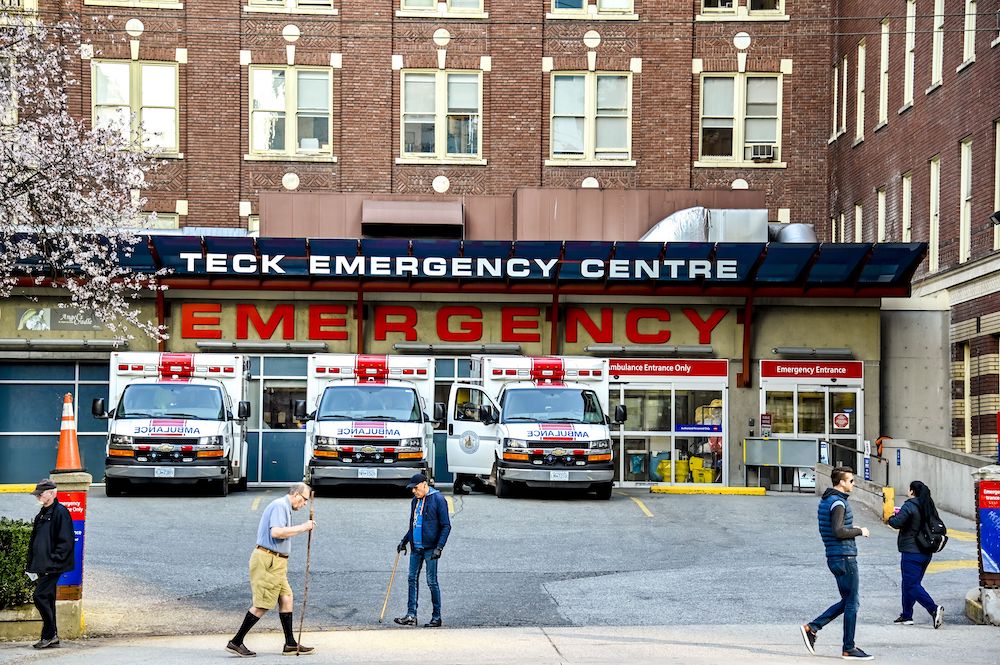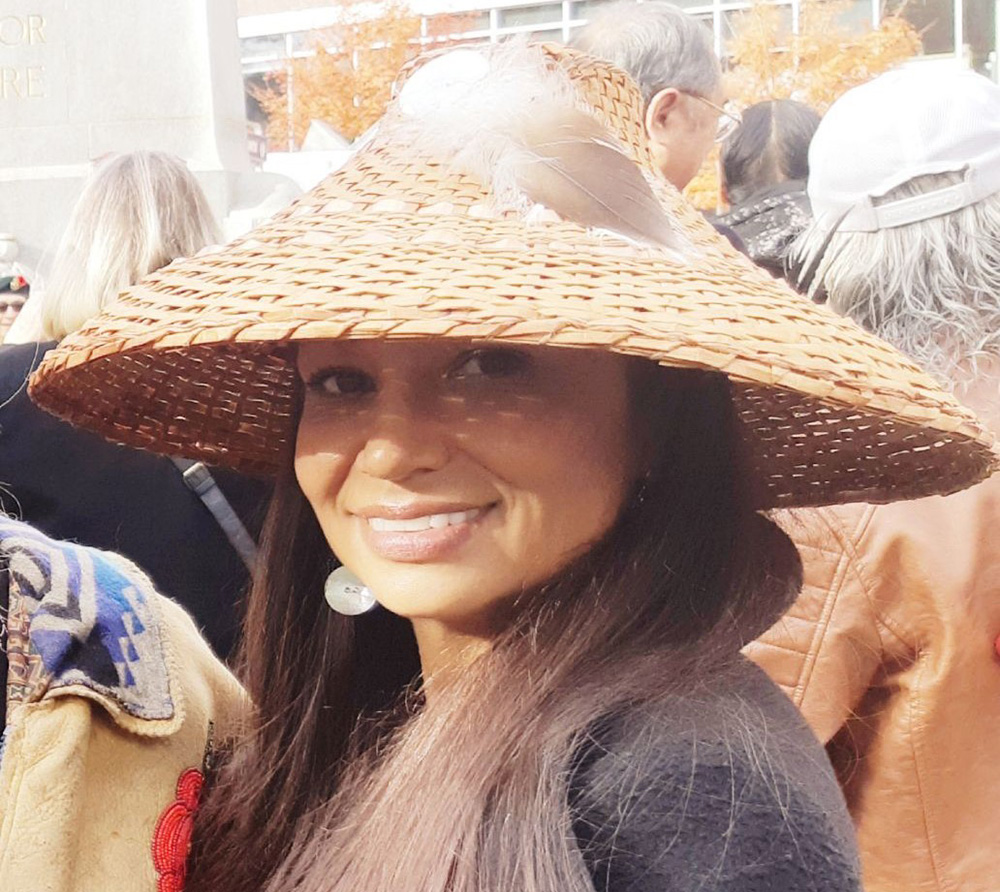Almost a month after Vancouver’s St. Paul’s Hospital eliminated an Indigenous health and wellness team, three of the terminated workers are speaking out about lack of support from hospital leadership and anti-Indigenous racism they witnessed and experienced.
All four Indigenous health and wellness worker positions were cut in November, with the jobs ending Jan. 13. The hospital says it is restructuring and expanding the program.
The three workers interviewed by The Tyee, with a combined experience at the hospital of more than a decade, said they routinely ran into obstacles when they tried to advocate for Indigenous patients with medical teams or raised examples of racism with managers — both part of their job descriptions. They often feared their jobs were in jeopardy when they spoke out.
Rebecca Hatch, one of the workers, said the racism faced by Indigenous patients was constant. (The Tyee agreed to a request to refer to her as Rebecca in subsequent references for personal reasons.)**
“It’s the negligence, the terrible bedside manner, the comments behind the scenes, the racism, the discrimination, the ignorance, the pushing of other people’s own biases and religious views onto our people that was unbearable,” she said.
Their stories echo the November report after an independent investigation that found anti-Indigenous racism in B.C. health care is “widespread and insidious.”
The report found the racism continued in part because senior leaders faced little or no accountability. It also reinforced the essential role of Indigenous health workers in creating cultural safety for patients.
Rebecca, who is Anishinaabe, said the wellness team had to deal with racism on a daily basis.
“The systems weren’t built with racism, they were built for racism,” she said. “So bumping and grinding up against that every day is exhausting. There’s no amount of self-care that you can do to take care of yourself if you don’t have support from the top down.”
The provincial report, by former representative for children and youth Mary Ellen Turpel-Lafond, found medical professionals routinely typecast Indigenous patients as less worthy of care for a variety of reasons. That discourages them from seeking help and results in worse long-term health outcomes, it found.
“Everything that was shared in that report, I witnessed in my two years working at St. Paul's Hospital,” said Rose McDonald, an Anishinaabe health worker.
Lavita Trimble, who is Nisga’a and has worked at St. Paul’s for two years, said it was common to hear health workers express harmful stereotypes about Indigenous patients or their family members, including claims they were likely intoxicated.
“That big assumption needs to stop,” she said. “Staff needs to open their eyes and realize that's not always the case.”
The women said they also often overheard staff suggesting that Indigenous patients who were unhoused or street-entrenched weren’t sick and just wanted a place to sleep or were trying to get a prescription for drugs.
“The spectrum and the range of assumptions is just insane,” said Rebecca. She said she saw homeless or poorly-housed patients discharged or turned away without receiving care because the hospital “needs the bed.”
“Our relatives come in there, really hoping that they can get the support that they need somehow,” said Rebecca. “And they just kick them out.”
“That often happens — the need for the bed comes before the actual care for people.”
St. Paul’s serves the downtown core area including the Downtown Eastside, where more than 80 per cent of unhoused people in Vancouver live. About 30 per cent of Downtown Eastside residents are Indigenous.
It is run by Providence Health Care, a non-profit organization that provides services in a contracted partnership with the Vancouver Coastal and Provincial Health Services authorities.
In the downtown communities hit hard by the overdose, housing and COVID-19 crises, Indigenous people are more likely to be unhoused or die of an overdose due to the historic and ongoing harms of colonialism and racism.
“It’s devastating,” said Rebecca, who had been an Indigenous health worker at St. Paul’s for nearly five years. “And it makes you see how far the impacts of colonization have reached through our communities, and how harmful they can be.”
All three workers said while harmful attitudes and actions were common, many non-Indigenous peers were also receptive to the learning and un-learning required to confront racism in health care. They received positive feedback from colleagues on other teams and felt they were making a difference in how people approached caring for Indigenous patients.*
But in addition to an environment where racism towards patients was common, Trimble and McDonald say they faced multiple reprimands for advocating for Indigenous patients. McDonald said she has felt “intimidated, bullied and harassed” by a higher-up because she was doing her job.
McDonald, whose traditional name is Miskwa Animikii Ikwe, filed a human resources complaint about bullying by a superior this fall.
A three-day internal investigation found no wrongdoing, said a Providence spokesperson. McDonald said she is appealing the decision.
“The truth is there were a lot of horrific things that I witnessed and experienced while I was working there,” said McDonald.
“I did advocate and liaise to the best of my ability, and I could even push a little bit. I was worried about losing my job sometimes, but… when people's lives are at stake, then me being fired was not even an issue.”
“Human life is more important than that. And being treated with dignity and respect is more important than that.”
On Dec. 1 the CBC reported all four positions were being cut.
The workers are Indigenous women who have training in traditional Indigenous knowledge and healing practices. They did everything from smudging hospital rooms with patients and their families, to leading prayer and song, to helping families communicate with medical teams caring for loved ones.
They said their services provided essential cultural safety for many people whose loved ones could not be there with them, especially during the pandemic.
“A lot of the patients that we see were recovering from some sort of experience, either residential school, Indian hospitals, or the '60s Scoop,” said Lavita. “And there's been a severance of that connection to community, so what made us happy was to connect someone to culture.”
Providence Health declined to provide someone to be interviewed about the workers’ allegations or the decision to eliminate the four positions.
Instead a spokesperson directed The Tyee to a public letter, wherein Providence said the positions were being eliminated in order to restructure the Indigenous health team, increase its size and align with initial direction from the province during Turpel-Lafond’s investigation.
“We take the immediate recommendations from the Ministry of Health and TRC [Truth and Reconciliation] Calls to Action very seriously, and are doing everything we can to ensure Indigenous patients receive culturally safe experiences while receiving our services,” read the letter.

When The Tyee asked the Health Ministry about its directions to health authorities on the issue, a spokesperson provided a portion of a letter sent to all health authorities in the early fall with initial recommendations.
The letter from Health Minister Adrian Dix directs them to “promote culturally safe services for Indigenous persons.”
“Five new Indigenous Liaison positions will be established and filled as a priority in each health authority to provide supports to Indigenous patients with health needs,” reads the letter. “The location, recruitment and focus for these positions will be determined in partnership with local Indigenous representatives.”
There is no mention of new standards or qualifications that would require Providence to eliminate the existing Indigenous health and wellness team.
Turpel-Lafond told the CBC that she had not ordered the changes at St. Paul’s and was looking into the circumstances of the women’s dismissal.
She confirmed her position in a statement to The Tyee.
“The report was not prepared to displace any workers or to make life more difficult for Indigenous peoples working in the health-care sector,” she wrote.
“I applaud the work of all Indigenous peoples in the B.C. health-care system. What happens at the point of care for Indigenous patients can be improved if Indigenous staff are part of the frontlines of the system. I encourage a greater investment in Indigenous staff and resources within the B.C. health-care system.”
The health authority has posted the new jobs, which unlike the current positions will be non-unionized. Candidates are required to have a bachelor's degree in social work, nursing, health care or equivalent qualifications and responsibilities are largely the same, although there is no mention of skills in traditional healing or ceremonies.
The women say the academic requirements and the lack of reference to knowledge of traditional healing signals that western colonial qualifications are being given priority over traditional knowledge and community relationships.
None of the women have social work or health-care degrees, but they have other traditional, community-led and post-secondary training and certifications.
“We work so hard to build that foundation for this kind of spiritual care in the hospital, only to have the westernized knowledge thrown at us,” said Trimble. “It’s kind of like pushing the Indigenous knowledge aside, once again, and history repeats.”
The women said it was painful to see how colonial harms continue to happen in health-care settings, such as when Indigenous babies were taken from their parents by child protection workers through a practice known as birth alerts. The system disproportionately impacts Indigenous children and was widely condemned by First Nations and Métis organizations before it was ended in 2019.
But their work, however challenging, helped the women feel they were making a difference.
They had been cautiously hopeful about further support when Dr. Lindsay Farrell, who is Anishinaabe, was appointed director of Indigenous Wellness, Reconciliation and Partnerships in the summer. But to see the changes enacted under her leadership felt like a slap in the face, the women said.
“It feels like slapping that Indigenous mask on a colonial idea and calling it an Indigenous idea,” said McDonald.
The Tyee’s request for an interview with Farrell was denied by Providence Health communications staff.
As negotiations between the Hospital Employees’ Union and Providence over the job cuts continue, the women say being asked to remain silent about their experiences has felt very “recolonizing.”
They worry about patients and community members who are uncertain if services will be available when their jobs end next month.
And while they welcome the news that the program will continue with five new workers, they are concerned that whoever is hired into the new roles will not be supported or safe in their work either.
“If you're trying to work within the system, if you don't have power, then you can't really create change, and you have a losing situation,” said Rebecca. “I see the gesture of the five liaisons. But in reality, the whole system needs to change.”
“There needs to be decolonizing done before you can Indigenize anything.”
*Story updated on Dec. 21 at 2:58 p.m. to add information about support the health workers received from colleagues and peers.
**Story updated on Dec. 22 at 1:47 p.m. to correct the name of one of the workers. ![]()
Read more: Indigenous, Health, Rights + Justice
















Tyee Commenting Guidelines
Comments that violate guidelines risk being deleted, and violations may result in a temporary or permanent user ban. Maintain the spirit of good conversation to stay in the discussion.
*Please note The Tyee is not a forum for spreading misinformation about COVID-19, denying its existence or minimizing its risk to public health.
Do:
Do not: